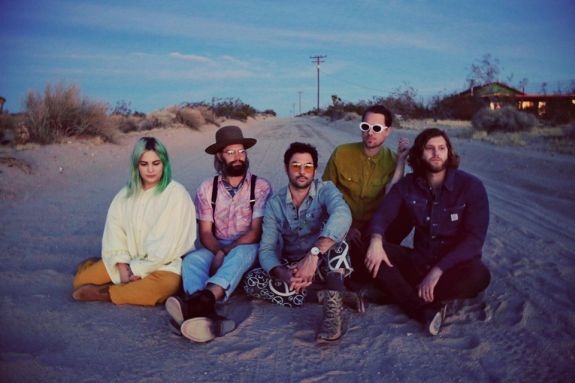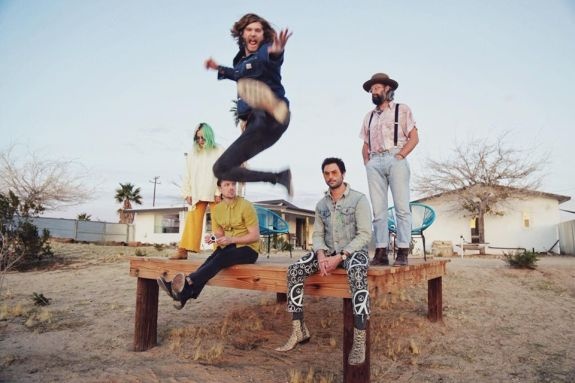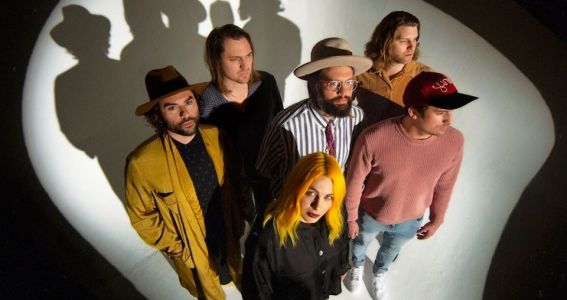Sto bene. Mi sto rilassando un po' prima di partire per il tour, me la sto prendendo comoda.
Sei emozionato per il tour?
Già! Sai, sono tre anni che non pubblichiamo un disco, quindi essendo uscito quest'ultimo e avendo la possibilità di lavorare su nuove canzoni da suonare dal vivo, così come tutte le altre, e anche su un nuovo design scenico, stiamo cercando di essere il più creativi possibile, e a questo punto è davvero bello poterci prendere la mano con queste cose.
Alcuni giorni fa avete pubblicato il vostro quarto studio album, "Living Mirage". Siete soddisfatti del vostro lavoro? Com'è stato il processo di creazione?
Sì, voglio dire, sono molto soddisfatto di questo album. Non penso che un artista si esprima sempre al 100%, perchè continui a pensare alle cose che faresti in modo diverso la volta successiva, ma a me questo disco sembra una completa descrizione personale: penso sia uno dei migliori che abbiamo mai fatto.
Che bello sentirti dire ciò!
Sì! In realtà è stato il disco più difficile da realizzare, già solo perchè non stavamo lavorando bene all'interno della band stessa: siamo diventati di nuovo amici in tanti modi. Sai, stare on the road per dieci anni può logorarti un po'. Penso che ci siamo riconnessi con questo album, ed è ciò che le canzoni significano per noi.
Infatti, negli ultimi tre anni, ci sono stati alcuni cambiamenti, specialmente nella formazione del gruppo, con la partenza di Josiah e l'arrivo di Matt [ndr, prime voci]. Ha questo influenzato il vostro modo di fare musica?
Sì, sicuramente l'ha influenzato. Penso che tutto ciò che accade nella tua vita in un qualche modo riecheggi nella musica che fai. Il modo in cui la facciamo è molto autobiografico, pertanto alcuni di quei dispiaceri hanno influenzato le canzoni, ma nel senso buono. Penso sia un processo di guarigione per noi creare musica a partire dalle cose contro cui lottiamo e attraversiamo ogni giorno, dunque sarebbe difficile negare il fatto che ciò non ci abbia influenzato.
Come hai detto le vostre canzoni sono molto autobiografiche, quindi per voi tutti la musica ha aiutato a riequilibrare le cose in un certo senso, giusto?
Sì, a ristabilire le connessioni tra noi all'interno della band, sicuramente. Sai, quando cresci e ascolti qualcuno che suona e che proviene da un Paese completamente diverso dal tuo, puoi percepire che noi esseri umani di tutto il mondo, in fondo, siamo uguali. Puoi sentirlo dalla musica.

Ora analizziamo il nome dell'album, "Living Mirage" (in italiano, Miraggio Vivente). La parola "miraggio" rappresenta qualcosa o qualcuno che percepisci anche se questo non è reale, ma l'aggettivo "vivente" ribalta il significato: suona piuttosto come un ossimoro. C'è una storia che vorresti raccontarci che lega tra loro le tracce del disco, a partire dal titolo?
Eravamo in California, nel deserto, in un posto completamente diverso rispetto agli altri in cui ci siamo ritrovati a scrivere. Ed eravamo tutti all'incirca sulla stessa lunghezza d'onda, stavamo ristabilendo i rapporti tra noi. "Living Mirage" era una sorta di jam, molto improvvisata, e alla fine di questa John [ndr, paroliere, cantante, chitarrista, percussionista] riusciva ad incastrare un sacco delle sue parole sulla base musicale. Semplicemente in questo flusso di coscienza vi era questa idea: i "miraggi viventi" sono quegli ingombri sul tuo cammino, quegli ostacoli che semplicemente ti metti nella testa, ma che in realtà non esistono. È più un concetto riguardante la sfera della salute mentale.
Quanto c'è della testa (di cervello, razionalità) e quanto del cuore (di sentimenti) nella vostra musica in generale, e nel vostro nuovo lavoro?
Penso che cambi di album in album. Penso che ci siano album in cui siamo stati più razionali e meno sentimentali, forse più guidati dall'azione, dalla realtà; mentre questo disco è più a proposito di sogni o desideri, le canzoni riflettono quest'idea. È più ottimistico, che è senza dubbio ciò che sento nel mio cuore e penso che tutti quanti noi stiamo vedendo le cose con ottimismo e positività. Dunque direi che "Living Mirage" è senza dubbio un disco complesso.
La vostra musica emerge con un ragionato equilibrio tra voci, percussioni, piano, violino da uno sfondo di vari generi come pop-rock, alt-folk, indie, tutti mescolati. E ciò si sente anche nel vostro nuovo lavoro, come se fosse il vostro marchio di fabbrica. Quali sono i punti in comune e le differenze di "Living Mirage" con gli album precedenti in termini di musica?
Ci saranno sempre la batteria, il basso, il piano, il violino, la chitarra acustica e le armonie (come hai detto tu, è praticamente il nostro tratto distintivo). Penso che ci siamo spinti nello sperimentare nuove sonorità (nuove per la band) in questo disco. Abbiamo spinto le nostre potenzialità sonore un po' più in là, per esempio in alcune parti il suono del violino sembrava quello della tastiera, o qualcosa del genere. Abbiamo preso la voce di Charity [ndr, violinista, cantante], l'abbiamo campionata e l'abbiamo modificata: queste sono idee per non essere limitati da qualunque siano le aspettative degli altri a proposito della nostra musica, o da quali siano le nostre stesse aspettative. A volte devi semplicemente uscire dalla comfort zone e sperimentare nuove cose, tracciare un nuovo cammino. E questo è il concetto di "Living Mirage": rimuovere le tue barriere mentali, superare i limiti che ti imponi e ottenere ciò che davvero vuoi.
Il prossimo mese partirete per un tour negli Stati Uniti e Canada. State pianificando degli show in Europa nel futuro?
Sì, non torniamo in Europa dal 2017. Ma non vediamo l'ora, speriamo nel 2020.
Questa era l'ultima domanda. Vorresti lasciare un messaggio finale a tutti quelli che leggeranno l'intervista?
Oh certo! Spero solamente che ognuno viva la propria vita al massimo. Penso alle cose che mettiamo in mezzo tra di noi esseri umani, e penso ai migranti, alle minoranze, chiunque. Questo disco è una testimonianza per dire che le barriere possono essere abbattute e che abbiamo bisogno di restare uniti come genere umano.
Grazie mille per il tuo tempo. Speriamo allora di vedervi presto in Italia!
Sì! Amiamo l'Italia, ci piacerebbe tornarci. Ciao!
--- ENG ---
Hi Tyler! Welcome to SpazioRock.it. First of all, how are you?
I'm doing well. I'm just relaxing a little bit before we start touring, so I'm just kinda taking it easy.
So, are you excited about the tour?
Yeah! You know, we haven't put out a record in three years, so having this one out and being able to work on, you know, new songs to play live, all songs to play live, and also a totally new stage design... We're just trying to be as creative as we can, and at this point it feels really good to hit the stride.
A few days ago you released your fourth studio album, "Living Mirage". Are you satisfied with all the work behind it? How was the process of creation?
Yeah, I'm really satisfied with this album. I don't think an artist is ever 100%, because you are always thinking about things that you'd do differently next time, but this record feels like a complete statement to me: I think it's one of my favorites that we've ever made.
So nice to hear this from you!
Yeah! Actually it was the hardest record to make just because we were not doing well in the band itself: we've become friends again in a lot of ways. You know, being on the road for ten years can get you worn down a little bit. I think that we reconnected on this record, and that's what the songs mean for us.
In fact, in the last three years, some changes occurred especially in the line up of the band, with Josiah's leaving and Matt's entry [ndr, lead singers]. Has this affected the way you make music?
Yeah, I'm sure it has, I think everything that happens in your life goes back into the music you make. The way we make music is very much kind of autobiographical, so I think some of those disappointments affected the songs in a good way. I think it's a healing process for us to make music about the things that we struggle with and go through every day, so it would be hard to say that this wouldn't affect us.

Your songs are very autobiographical, so making music was a way for you all to heal, to re-estabilish things in a sort of way, wasn't it?
Yeah, to re-estabilish connections with each other within the band, for sure. You know, when you grow up and you listen to somebody playing music from a wholly different country, you can sense that we humans from all over the world are kinda the same. You can get that feeling from music.
As said, the album is called "Living Mirage". The word "mirage" represents something or someone you see even if isn't true, but the adjective "living" reverse this meaning. So it sounds like an oxymoron. Is there a story that you'd like to tell us through the tracks of the album, beginning with the album title?
We were in California, in a desert: it's very different from where we've ever written before, to begin with. And we were on the same page, we were connecting with one another in the band at first. "Living Mirage" was just kind of a jam, very improvisational, and at the end of it John [ndr, songwriter, singer, guitarist, percussionist] could freestyle a lot of his lyrics on the top of it. Just stream-of-consciousness laid down this idea: "living mirages" are those obstructions in your path, those obstacles that you just put up in your own mind, barriers you put on your own way, and they don't really exist. It's more of a mental health issue.
And how much of the head (brain, rationality), and how much of the heart (feelings) is there in your music in general and in your new album?
I think it shifts from album to album. I think there are albums in which we were a little bit more head and less emotional, maybe more action-driven, more reality-driven; whereas this record feels kind of about dreams or wishes, the songs have this idea. It's more optimistic, which is definitely how I feel in my heart, and how I think we all kind of see things with optimism and positivity. So I would say that definitely "Living Mirage" is a hard record.
Your music results in a thoghtful equilibrium between vocals, percussions, piano and violin on a background of various genres like pop-rock, alt-folk and indie, all mixed. It's perceived in your new work, too, like your trademark. What are common points and differences between "Living Mirage" and the previous albums in terms of music?
There's always going to be drums, bass, piano, violin, acoustic guitar, and armonies (as you said, it's kind of our trademark sound). I think we pushed ourselves in experimenting new sounds, new to the band, on this record. We pushed our sonic power a little bit further, for example in some parts violin sounded like keyboards or something like that. We took Charity's [ndr, violinist, singer] vocal and we sampled it and kind of affected it: those are ideas of not being restrained by what other's expectations may be of our music, or maybe what our own expectations are. Sometimes you just have to break out of the box a little bit and try new things, define a new path. And that's the concept of "Living Mirage": to remove your mental barriers, to go outside the boxes you put yourself in, and to get what you actually want to.
Next month you're leaving for a US and Canada Tour. Are you planning shows in Europe in the future?
Yeah, we haven't been back to Europe since 2017. But we're excited to get back, I think in 2020, hopefully.
This was the last question. Would you like to leave a final message to those who'll read this interview?
Oh yeah! I just hope that everyone lives his/her life to the fullest. I think of the devices we put up within humanity and between each other, and I think of immigrants, minorities, anyone... Well, this record is a testament to say that barriers can be broken down, and we all need to come together as a human race.
Thank you very much for your time. Hope to see ya all here in Italy soon!
Yeah! We love Italy, we'd love to be there. Bye!

